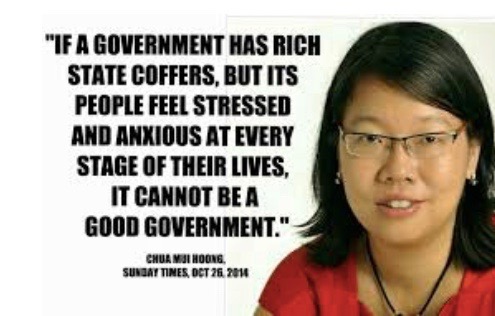For the rest of the world, Singapore has often been a point of intrigue. It is a small country, so small in fact that traveling from one end to another would take you less than an hour. Yet currently, this country has one of the highest GDP per capita in the world. Because Singapore’s independence spans only a little more than half a century, this achievement is widely viewed as an incredible feat. However, since Singapore has operated under what some western political scientists would consider an authoritarian regime, the true intricacies of this country are often lost amid all the negativity.
That is why upon reading well-known editor-writer Chua Mui Hoong’s recently released book titled ‘Singapore Disrupted’, I found that it truly provides an unaltered, honest look and perspective into recent events in Singapore, especially useful for those relatively new to thiS remarkable city-state. Although she remains a respectful commentator, many Singaporeans will still be shocked at how candid Chua is in in her collection of articles. For a country where many political columnists would rather remain under the radar, Chua is a knowledgeable and well-connected intellectual outlier who is unafraid to take up controversial topics, including issues of class, technological disruption in the workplace, politics and political styles, with integrity and clarity.
Her main point is unmistakable clear: in a disrupted world, Singapore needs to remain progressive and will require a reorder not to be stuck in the past. This reorder suggests that Singapore has to be open to the next generation’s ideals and leadership, instead of focusing on past leadership methods.
Chua shares many personal stories, which makes this book extremely warm, relatable and personable. She describes her awareness of class consciousness, and although Singapore suffers from the issue of income inequality, it still very much presents opportunities for social class mobility as long as one excels academically. However, Chua implores that we need to go beyond this structure of “academic aristocracy” through a reform where rewards are distributed more equitably so people who have not performed well academically can still enjoy a rewarding future.
This well-respected and influential Straits Times veteran, through her years of observing Singapore’s growth, also suggests that international disrupters (Amazon, Alibaba etc.) are intruding into the economic market in Singapore, causing dislocation. The typical Singaporean business owner, who once operated in his/her bubble, is no longer do so, when the competition operates at a much bigger scale than before. Chua worries about the mindsets of Singaporean business owners who she describes as having “habits of the 1990s”, where they are transfixed on competing domestically despite growing international competition. In such a disruptive time, Chua hopes that Singaporeans can cope with this disturbing international trend and ditch old habits through domestic cooperation where business owners collaborate through sharing expertise. Firstly, it is for the younger generation of Singaporeans to learn from the past and think more critically about the present. Secondly, it is for the older generation of Singapore to reminisce about the past and, one hopes, adapt to new ways. Lastly, it is for the rest of the world to develop an intimate understanding of Singapore through what its citizens call a “heartlanders lens” – rather than through the narrow focus of an elite.
For the younger generation of Singapore, which has little idea of how Singapore came to be, Chua’s last section ‘Chronicles from the Court of Lee’ is a heartfelt dedication to the late Lee Kuan Yew. Although she touches on some controversial topics in Singapore such as the Oxley Road dispute, it is evident that Chua retains a high regard for the Lee family. She displays this by revealing the more personal moments she has had with the “royal” family of Singapore and how the former Lee has impacted her life.
Singapore Disrupted by Chua Mui Hoong is therefore – in this humble book reviewer’s opinion – a masterful compilation of incisive, thought-provoking articles that will serve and delight a wide audience. It is highly recommended.
(The reviewer is an Asia Media staffer who was born in Southeast Asia.’Singapore Disrupted’ has just been published by Straits Times Press of Singapore.)

